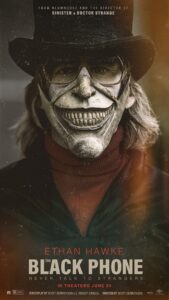THE BLACK PHONE **** USA 2021 Dir: Scott Derrickson. 102 mins
 The movie that Scott Derrickson made following the creative differences surrounding DOCTOR STRANGE IN THE MULTIVERSE OF MADNESS is a reminder of his talent for sustaining a dread-filled ambience (as best demonstrated in SINISTER) while telling a story of surprising emotional resonance. Though adapted from a 2004 Joe Hill short story, Derrickson has been honest about the very personal connection he has to the themes and horrors at play here. It’s a period piece that doesn’t feel a need to overemphasise the period – and a grim horror tale of child abduction and murder that doesn’t wallow in gore and shock effects, but showcases truly impressive, authentic juvenile performances of characters we root for.
The movie that Scott Derrickson made following the creative differences surrounding DOCTOR STRANGE IN THE MULTIVERSE OF MADNESS is a reminder of his talent for sustaining a dread-filled ambience (as best demonstrated in SINISTER) while telling a story of surprising emotional resonance. Though adapted from a 2004 Joe Hill short story, Derrickson has been honest about the very personal connection he has to the themes and horrors at play here. It’s a period piece that doesn’t feel a need to overemphasise the period – and a grim horror tale of child abduction and murder that doesn’t wallow in gore and shock effects, but showcases truly impressive, authentic juvenile performances of characters we root for.
It’s Denver, 1978. Conversations about The Partridge Family and the Fonz dominate kid-talk, plus the old debate about which is better: THE TEXAS CHAIN SAW MASSACRE or ENTER THE DRAGON. Mason Thames excels as the central character Finney, beset by bullies at school and suffering the painful impact of alcoholism from his abusive, declining father (Jeremy Davies) in the wake of his mother’s death. Madeleine McGraw is Finney’s foul mouthed, feisty but somehow appealing sister, who has psychic visions of bad things to come – her late Mom had the same dream power. Several of these elements are familiar (as are the presence of black balloons in the van of the villain) from the realm of Stephen King but it doesn’t feel like it’s feeding off the maestro.
“The Grabber” is brilliantly played by Ethan Hawke, his face often fully or partially obscured by masks and with a visage echoing that of Conrad Veidt in THE MAN WHO LAUGHS. After his pal is taken by the black van-driving kidnapper, Finney meets the same fate. The Grabber is a part-time magician and the one who haunts Finney’s sister’s visions. Hawke’s voice shifts – sometimes fey, sometimes incredibly threatening – as a reflection of the character’s insanity. While incarcerated and facing what seems certain death, Finney learns that the eponymous phone in his cell allows apparitions of The Grabber’s past victims to communicate through the receiver.
The picture has a great lo-fi visual style that helps to sell the notion that this might have been made in the very period in which it is set. In a nod to the kind of stuff horror fans like Hill or Derrickson might have been viewing for the first time in this era, the protagonist is seen watching that nightmarish bathroom scene from THE TINGLER on TV. The gradual reveal of The Grabber is superbly achieved – hovering on the periphery of the bigger picture for a while, glimpsed in passing, haunting the Denver streets in search of his prey.
The emotional kick is what pleases the most. There’s a heart-breaking / horrifying reveal from a deceased past Grabber victim, via the black phone: “I don’t remember my name. It’s the first thing that goes”. Jeremy Davies finds surprising depth in what could have been a one-dimensional character as the physically and verbally abusive father who is himself dealing with immense trauma and mental health issues. It’s tense, gripping and deceptively straight-forward, meshing together familiar genre narrative elements with an omnipresent threat of violence – but not talking down to its audience and cannily using its formidable antagonist for maximum impact. No wonder it has proved a huge commercial worldwide hit.
Review by Steven West
THE BLACK PHONE is available on Amazon

